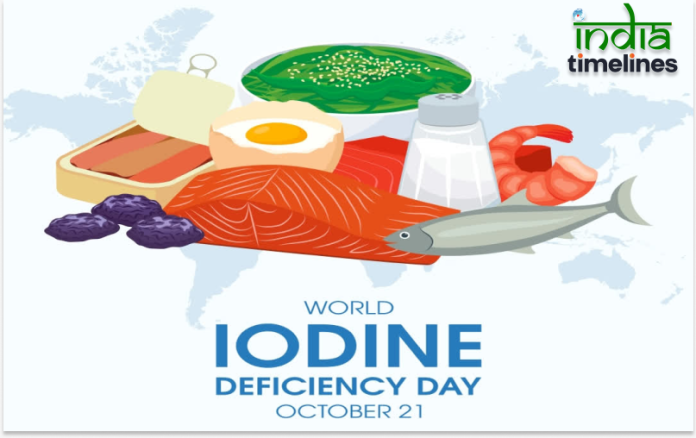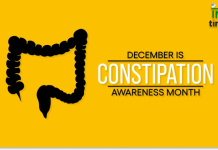
Iodine deficiency remains one of the most significant preventable causes of cognitive and developmental disorders worldwide. World Iodine Deficiency Day, observed annually on October 21st, shines a light on the importance of iodine in our diets and the critical need to eliminate iodine deficiency disorders (IDD) globally.
While iodine might seem like a minor nutrient, it plays a massive role in maintaining overall health, particularly for thyroid function and brain development. World Iodine Deficiency Day seeks to raise awareness about iodine deficiency, its effects on human health, and the steps we can take to combat it.
Understanding Iodine and Its Importance
Iodine is a vital trace mineral that is crucial for the production of thyroid hormones, which regulate various body functions, including growth, metabolism, and brain development. The human body doesn’t naturally produce iodine, so it must be obtained through food sources or supplements.
A deficiency in iodine can lead to various health problems, most notably affecting the thyroid gland, which can result in conditions such as goiter, hypothyroidism, and developmental delays in children.
The Role of Iodine in Thyroid Health
The thyroid gland uses iodine to produce thyroid hormones, thyroxine (T4) and triiodothyronine (T3), which are essential for regulating the body’s metabolic rate, heart function, digestive health, muscle control, and brain development. A lack of iodine impairs the production of these hormones, leading to a range of health issues, especially in children and pregnant women.
Iodine and Pregnancy: A Critical Need
Iodine is particularly essential during pregnancy and early childhood. Pregnant women require more iodine to support the growing fetus, especially for brain development. Without sufficient iodine, babies can be born with mental impairments, growth issues, and even congenital hypothyroidism.
What Are Iodine Deficiency Disorders (IDD)?
Iodine Deficiency Disorders (IDD) refer to a spectrum of health problems caused by inadequate iodine intake. These can range from mild to severe, and in some cases, they can be irreversible, particularly if iodine deficiency occurs during early stages of life. Some common iodine deficiency disorders include:
- Goiter: Swelling of the thyroid gland due to overstimulation caused by iodine deficiency.
- Cretinism: Severe cognitive and physical impairment in newborns caused by iodine deficiency during pregnancy.
- Hypothyroidism: A condition where the thyroid gland doesn’t produce enough thyroid hormones, leading to fatigue, weight gain, and depression.
- Developmental Delays: Iodine deficiency in children can lead to stunted physical growth and impaired cognitive development.
Global Impact of Iodine Deficiency
Despite global efforts, iodine deficiency remains a widespread problem, especially in developing countries where access to iodine-rich foods is limited. According to the World Health Organization (WHO), about 30% of the world’s population is at risk of iodine deficiency, with nearly 1.9 billion people affected globally.
Sub-Saharan Africa, South Asia, and parts of Eastern Europe are particularly prone to iodine deficiency. In these regions, iodine deficiency is often linked to poor dietary intake and lack of access to iodized salt, the most common form of iodine supplementation.
The Role of Iodized Salt in Combating Iodine Deficiency
One of the most effective strategies in addressing iodine deficiency has been the universal iodization of salt. This simple and affordable method involves adding small amounts of iodine to table salt, which is consumed by the majority of the population.
Thanks to global initiatives like the Universal Salt Iodization (USI) program, introduced by the WHO and UNICEF, iodine deficiency has been significantly reduced in many parts of the world. However, more work is needed to ensure that all communities, particularly those in impoverished and rural areas, have access to iodized salt.
How to Prevent Iodine Deficiency
Prevention of iodine deficiency is achievable through simple dietary changes and public health measures. Here are key strategies to ensure adequate iodine intake:
- Consume Iodized Salt: Using iodized table salt in cooking is the easiest and most common way to prevent iodine deficiency.
- Eat Iodine-Rich Foods: Include foods like seaweed, fish, dairy products, and eggs, which are rich in iodine, in your diet.
- Supplements: In cases where dietary intake is insufficient, iodine supplements can help, particularly for pregnant and breastfeeding women.
- Public Health Education: Educating communities about the importance of iodine and the benefits of iodized salt can have a significant impact on preventing IDD.
Challenges in Eradicating Iodine Deficiency
While the introduction of iodized salt has helped reduce iodine deficiency in many parts of the world, several challenges remain:
- Lack of Access: In some developing regions, iodized salt is either unavailable or too expensive for the general population.
- Awareness Gaps: Many people are unaware of the importance of iodine in their diet and may not prioritize iodine-rich foods.
- Cultural Factors: In certain areas, there may be cultural resistance to iodized salt or a preference for local salts that are not fortified with iodine.
World Iodine Deficiency Day 2024: Raising Awareness
World Iodine Deficiency Day 2024 focuses on increasing awareness about the ongoing global issue of iodine deficiency and its impact on health. This year’s theme emphasizes the importance of education, prevention, and action. Governments, health organizations, and communities are encouraged to participate in efforts that promote iodine-rich diets and the use of iodized salt.
Global Efforts to Combat Iodine Deficiency
Countries worldwide, with the support of organizations like WHO and UNICEF, have implemented programs to combat iodine deficiency. These programs include public health campaigns, salt iodization policies, and efforts to monitor iodine levels in at-risk populations.
Notable Global Initiatives
- Universal Salt Iodization (USI): A global initiative led by WHO and UNICEF to ensure that all table salt consumed by humans is iodized.
- School-Based Programs: Some countries have introduced iodine supplementation programs in schools to ensure children receive adequate iodine intake.
- Health Education Campaigns: Governments and NGOs promote awareness about iodine deficiency and encourage the consumption of iodine-rich foods and iodized salt.
The Role of Nutrition in Preventing Iodine Deficiency
Besides iodized salt, certain foods are naturally rich in iodine and can be included in the diet to prevent deficiency. These include:
- Seaweed: One of the richest sources of iodine.
- Fish and Seafood: Particularly cod, tuna, and shrimp.
- Dairy Products: Milk, cheese, and yogurt provide iodine.
- Eggs: Especially the yolk, which contains iodine.
Pregnancy and Iodine: A Vital Nutrient for Moms and Babies
Pregnant women are one of the most vulnerable groups to iodine deficiency. Inadequate iodine during pregnancy can lead to complications such as miscarriage, stillbirth, and developmental issues in the baby. Health organizations stress the importance of iodine supplementation during pregnancy to ensure both maternal and fetal health.
The Future of Iodine Deficiency Prevention
With continued efforts and collaboration between governments, health organizations, and communities, the goal of eradicating iodine deficiency is within reach. New technologies and improved public health policies can help ensure that even the most remote and underserved populations have access to iodine-rich diets.
India Time Lines
Conclusion
World Iodine Deficiency Day 2024 is an opportunity to reflect on the global progress in reducing iodine deficiency and renew efforts to eliminate it entirely. Ensuring adequate iodine intake is a small yet powerful step toward improving overall health and preventing serious developmental disorders. As awareness grows and preventive measures are strengthened, we can envision a world free from iodine deficiency disorders.



































